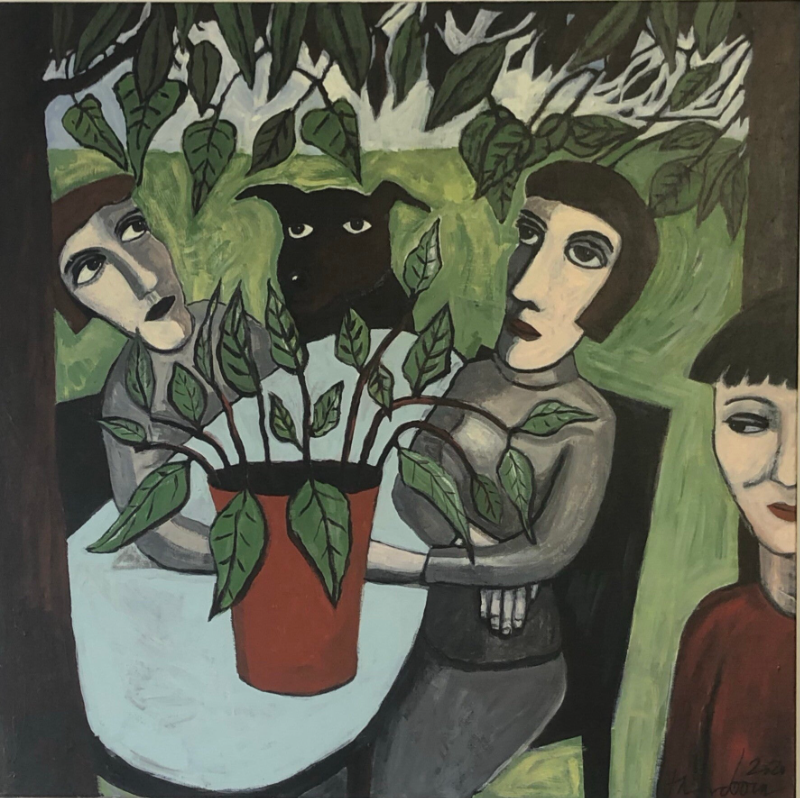Art and Philosophy: Epicurus
Welcome to the website of Gallery Sorelle Sciarone, where the world of art comes alive with captivating exhibitions and thought-provoking collections. In this article, we delve into the profound connection between philosophy and art, specifically exploring the teachings of Epicurus (341-270 BCE) this time (for Confuciusism article and art). Understanding these philosophical principles is crucial for art enthusiasts seeking to expand their enjoyment and appreciation of artistic expressions. By delving into Epicurean philosophy, we can uncover a world where pleasure, gardening, friendship, and even death intertwine with artistic creation and appreciation. Discover how these timeless concepts resonate with the art showcased at Gallery Sorelle Sciarone and why exploring their significance now can deepen your understanding of art's transformative power.
"Garden Party", (2020). Thea van Doorn. Acrylic on Linen. 100cm x 100cm
Epicurus: Greek Philosopher
Epicurus (341-270 BCE), is a Greek Philosopher known for his teachings on pleasure and tranquility. He believed that true happiness could be found in contentment with the simple pleasures life has to offer. Namely gardening and eating together. Something we know Millennials have embraced with their avocado and toast brunches and plant parenthood journeys.
This philosophy, centers around embracing modesty and finding joy in the little things, encourages individuals to cultivate independence and self-sufficiency. In line with this notion, Epicurus purchased a garden in Athens, which served as a space for reflection, inspiration, and communal gathering. Unlike the societal norms of the time, Epicurus welcomed women and enslaved individuals into his garden, fostering an inclusive environment for philosophical discussions and the pursuit of knowledge.
"Afspraak", (2020). Thea van Doorn. Acrylic on Linen. 70cm x 60cm.
Gardening, Death and Eating Together
One of the key aspects of Epicurean philosophy is the contemplation of death. By employing logical reasoning, Epicurus aimed to alleviate the fear associated with mortality. According to his teachings, when we are alive, we are not experiencing death, and once death arrives, we will no longer be present to feel its effects. This perspective encourages individuals to embrace the present moment and live without the constant fear of the unknown.
Friendship also held great significance in Epicurus' philosophy of a fulfilling life. Believing that meaningful connections were vital to human well-being, Epicurus valued the companionship and shared experiences that friendship brings. Similarly, in the realm of art, collaboration and communal appreciation play a significant role. Whether through artist residencies, gallery visits with friends, or engaging in conversations over a meal, the shared experience of art deepens our understanding and fosters the formation of meaningful relationships.
Critics of Epicureanism argue that its focus on individual pleasure and self-centeredness undermines the potential for deep and lasting connections. They contend that forming meaningful relationships inherently opens us up to the pain of loss when those connections are severed, such as the death of a close friend. However, Epicurus aimed to guide individuals towards a happy and tranquil life, free from the fear of pain and death. By cultivating self-awareness and fostering relationships grounded in mutual respect and understanding, individuals can navigate the complexities of life while embracing the joys that art and friendship bring.
"Tuinrust", (2020). Thea van Doorn. Acrylic on Linen. 100cm x 100cm.
Vacuum packed Living
What this Epicurean philosophy means for art; art should not be created or enjoyed in a vacuum, but with others. This often translates to artist residencies or visiting galleries and museums with a friend. Then enjoying eating together while the many impressions in viewing or creating art takes the time to sink in. In these conversations knowledge can be expanded, and deeper relationships can be formed. I know many museum goers feel a weird sense of alienation that they would rather have coffee and a cake with friends 2 hours into their museum visit than visit more rooms. Other individual may take time to look at each individual object for a significant time, nose almost pressed to a piece. I know I used to do this, to show that they are true enjoyers of art.
My first-year trip with my Art History professors, to Paris (and London the following year, as I started my Bachelor in 2009 and again in 2010, due to failing my Dutch entrance exam in 2009), quickly taught me that we might only visit two pieces per museum, and long lunches and dinners were integral in letting pieces and their vast cultural significance sink in. It is simply not possible to consume so much art, philosophy, and theory ad nauseum without losing some capacity to fully grasp what you have seen and understood. Taking time to sit with it and chat, helps you to digest vastly more than speeding through everything. This is an integral part of enjoying life and art.
At Gallery Sorelle Sciarone, the influence of Epicurean philosophy can be witnessed in the way art is created, enjoyed, and discussed. Art is not meant to exist in isolation but rather be shared and experienced with others. Just as Epicurus found solace and inspiration in his garden, Gallery Sorelle Sciarone provides a nurturing environment where art thrives, friendships are formed, and the transformative power of artistic expression is celebrated.

"Bergen aan Zee", (circa 2019). Thea van Doorn. Acrylic on Linen. 100cm x 120cm.
Exploring and Appreciation
By exploring the profound teachings of Epicurus and their intersection with the world of art, we open ourselves up to a new realm of understanding and appreciation. The timeless concepts of pleasure, gardening, friendship, and mortality infuse art with deeper meaning and significance. Now is the perfect time to delve into the philosophies that underpin artistic creation and explore the captivating collection at Gallery Sorelle Sciarone. Embark on a journey!




Add comment
Comments